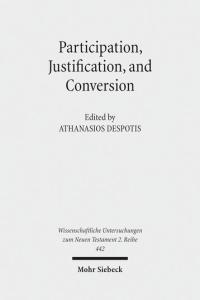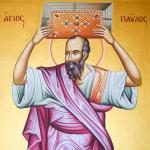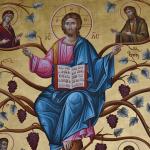Among the various perspectives on Paul is the viewpoint held by those from the Eastern Orthodox tradition. Athanasios Despotis provides us with good insight on Paul in this tradition. I had the privilege of catching up to him asking him about some of his scholarly research.
Professor Despotis belongs to the faculty department of the New Testament at Rheinische Friedrich-Wilhelms-Universität, Bonn, Germany. He has published monographs such as, Greek and Byzantine Philosophical Exegesis, Eastern Church Identities 5 (Leiden: Brill, 2022) (with James Buchanan Wallace), a study on Paul and John regarding conversion-experience and memory entitled in German, Bekehrungserfahrung Und Bekehrungserinnerung Bei Paulus und Johannes (Brill Schoningh, 2021), and another German work that compares the New Perspectives on Paul with Greek Orthodox interpretation: Die ‘New Perspective on Paul’ und die grieschisch-orthodoxe Paulus interpretation. Die Veröffentlichungen des Instituts für Orthodoxe Theologie 11 (EOS Verlag, 2014).
Despotis has published a volume in English also from Mohr Siebeck entitled, Participation, Justification, and Conversion: Eastern Orthodox Interpretation of Paul and the Debate between Old and New Perspectives on Paul. This book became the topic of my interview with Dr. Despotis.

The Interview
Oropeza
To refresh our readers, the New Perspective originated largely through E. P. Sanders’s famous work, Paul and Palestinian Judaism (Fortress Press). His work demonstrated through ancient Jewish-Palestinian literature that the “Judaism” in Paul’s day was a religion of grace. A number of Protestant theologians had incorrectly understood it as a legalistic “works-righteousness” religion. Sanders claimed that Jews held to covenantal nomism in which God by grace chose Israel and established a covenant with them (Mosaic) that they were expected to obey. James D. G. Dunn, N. T. Wright, and others developed their theology from this viewpoint to teach that Paul’s problem with Mosaic law was not due to it being legalistic but ethnocentric. Paul’s rivals were attempting to make his gentile converts into Jews by having them circumcised and observe Jewish customs. Hence, Paul opposed them by insisting that gentiles only need faith in Christ* to be considered righteous, not “works of the law.”
Dr. Despotis, you have written not one but two books that engage the New Perspective on Paul with the Greek Orthodox tradition — Participation, Justification, and Conversion (Mohr Siebeck) and Die ‘New Perspective on Paul’ (EOS). That is quite an accomplishment!
Could you please tell me what your main thesis is in the earlier work, Die ‘New Perspective on Paul’?
Despotis
The first volume is my “Habilitationsschrift” in German, which was unanimously accepted by the Protestant Faculty of the University of Bonn in 2012 and published by EOS-Verlag in 2014. In this work I undertake a historical-critical analysis of key Pauline texts on justification by faith.
I also examine how three prominent schools of modern exegesis interpret these passages— proponents of the New Perspective on Paul (NPP), scholars of the Paul within Judaism persuasion (or Radical New Perspective on Paul), and defenders of the Lutheran interpretation. In addition, I engage with Eastern patristic and contemporary Greek exegesis of Paul in order to identify significant parallels and differences between the NPP and Eastern patristic interpretations.
Oropeza
How is this book different than your more recent Mohr Siebeck volume, Participation, Justification, and Conversion: Eastern Orthodox Interpretation of Paul and the Debate between Old and New Perspectives on Paul?
Despotis
Upon completion of the first book, and building on this research, I published a collaborative project in the WUNT II series for Mohr Siebeck (WUNT stands for Wissenschaftlichen Untersuchungen zum Neuen Testament: “Scientific Investigations in the New Testament”). This project includes thirteen international scholars. It addresses various issues, including the meaning of the concept of participatory union in Paul and its significance in the process of justification by faith. It also explores the relationship between these concepts and the conversion experiences of early Christ-followers, analyzing how they reflect such experiences.
Oropeza
What do you consider to be the main points of agreement between the New Perspective and Eastern Orthodoxy?
Despotis
My study of the Greek patristic material has shown that the key themes of the New Perspective are in part already present in the Greek Fathers. The continuity between Jewish and Christian “religion,” the ethnocentric or “nationalistic” aspect of Paul’s opponents’ criticism of his “lawless” gospel, and the ecclesiological significance of Paul’s doctrine of justification by faith are all concepts that the Greek Fathers were also aware of. I have demonstrated this by references to patristic works.
Oropeza
What are the main differences?
Despotis
Eastern patristic interpretations emphasize a radically new reality in Christ. According to this view, the difference between Paul and Judaism cannot be understood on the basis of legalism or nationalism—i.e., ethnocentrism (Dunn, Wright)—but rather on an ontological basis, namely the incomparable superiority of the new reality in Christ.
The reason why Paul turns from his zeal for the Jewish nation to faith in Christ is that in Christ a new reality emerges. This is one in which death is abolished and a person can now attain holiness and eternal life through faith in Christ. Certainly, this approach excludes any other way of salvation except through faith in Christ.
This interpretation, then, cannot agree with Krister Stendahl’s** thesis that the Jews have the υἱοθεσία (“sonship”/ “adoption as sons”) and they do not need to come to Christ to become God’s children. There is a strong Christocentric view that distinguishes the Greek Orthodox tradition from the New Perspective. Christ is incomparably superior to the Law because he has fulfilled what the Law had prepared humanity for: the destruction of death.
Oropeza
What is your (or Eastern Orthodoxy’s) perspective on E. P. Sander’s covenantal nomism? Do you agree with Sanders’s interpretation of Second Temple Judaism as a religion involving grace for “getting in” and nomism to be “staying in” the covenant as a “pattern of religion”?
Despotis
In my view, the terms “religion,” “getting in,” “staying in” and the like are technical conventions that cannot accurately interpret ancient religious-philosophical thinkers.
Hellenistic Jewish exegetes like Philo of Alexandria or Greek fathers like John Chrysostom understood Judaism or early Christianity as “true philosophy” rather than “religion.” Moreover, these thinkers share with the New Testament writers a compatibilist understanding of “salvation history.” Accordingly, divine action and free human choice are of vital importance both for entering and remaining in the “people of God.”
Oropeza
What is the relationship between faith/trust and obedience or covenant keeping?
Despotis
Πίστις (often translated as “faith”) is not understood as a counterpoint to human works or boasting. Πίστις, by which one enters the community, is not a blind faith injected from outside, but it presupposes active human obedience to the gospel; for example, Romans 6:17 (ὑπηκούσατε δὲ ἐκ καρδίας/ “you obeyed from the heart”). It is always linked to ritual baptism into the community of Christ’s believers (Galatians 3:26–27).
The Pauline πίστις also refers to ongoing and active faithfulness to the gospel, so that human behavior is essential for final salvation or justification (e.g., Galatians 6:4). Otherwise, there is a danger that the gift of God’s call and the effect of baptism will be lost.
Oropeza
Sounds like there is a real potential for believers to commit apostasy. Since I have written four different books on this subject of apostasy, I surely would not disagree! New Perspective scholars like James Dunn and Kent Yinger, I think, also would not disagree with this. And Don Garlington has written forcefully on the importance of perseverance in Paul.
I’ll be back shortly with some more questions…
Notes
* Regarding the phrase, pistis Christou, such as found in Galatians 2:16, James Dunn insists that it is to be understood as “faith in Christ,” whereas N. T. Wright (and Richard Hays) claim it is “faithfulness of Christ.” As is evident here, and with Stendahl below, New Perspective scholars do not always agree with each other. For similarities and differences, along with a trajectory in relation to other perspectives, see B. J. Oropeza and Scot McKnight “Paul in Perspective: An Overview of the Landscape More than 40 Years after Paul and Palestinian Judaism,” in Perspectives on Paul: Five Views (Baker Academic, 2020), 1–24.
** Krister Stendahl is considered a sort of precursor or “grandfather” to the New Perspective on Paul. His article, “The Apostle Paul and the Introspective Conscience of the West,” Harvard Theological Review 56 (1963) 199–215, was influential on Sanders, Dunn, and others. Among other things, it argues that Paul did not suffer from guilt related to sinning or not being able to keep Mosaic Law perfectly as a Pharisee. Rather, Paul considered himself blameless regarding Law observance (cf. Phil 3:3–8). He also held to other doctrines not necessarily embraced by New Perspective scholars. His relevant thoughts are best captured in his book, Paul among Jews and Gentiles, and Other Essays (Fortress, 1976).














